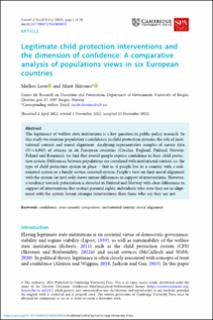Legitimate child protection interventions and the dimension of confidence: A comparative analysis of populations views in six European countries
Journal article, Peer reviewed
Published version

Åpne
Permanent lenke
https://hdl.handle.net/11250/3077125Utgivelsesdato
2023Metadata
Vis full innførselSamlinger
- Department of Government [457]
- Registrations from Cristin [9791]
Sammendrag
The legitimacy of welfare state institutions is a key question in public policy research. In this study we examine population’s confidence in child protection systems, the role of institutional context and moral alignment. Analysing representative samples of survey data (N=6,043) of citizens in six European countries (Czechia, England, Finland, Norway, Poland and Romania), we find that overall people express confidence in their child protection system. Differences between populations are correlated with institutional context, i.e. the type of child protection system in place – that is, if people live in a country with a risk-oriented system or a family service-oriented system. People’s view on their moral alignment with the system (or not) only shows minor differences in support of interventions. However, a tendency towards polarisation is detected in Finland and Norway with clear differences in support of interventions that restrict parental rights: individuals who state they are in alignment with the system favour stronger interventions than those who say they are not.
